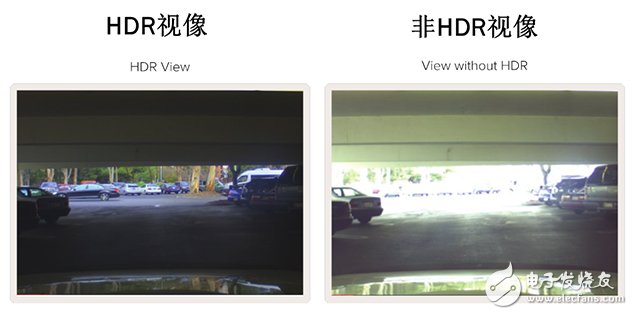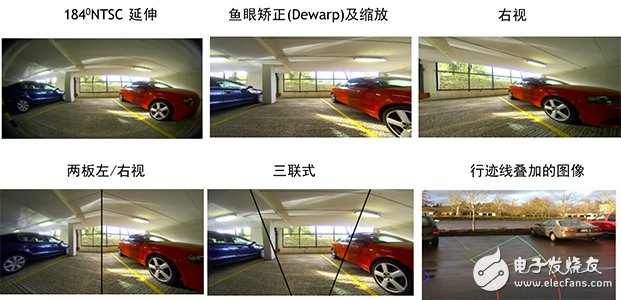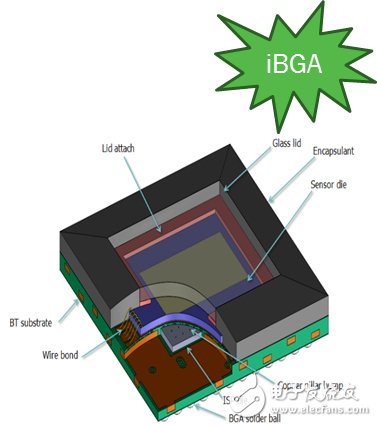The automotive industry is moving towards autonomous driving, and automotive designers and developers are increasingly focusing on the active safety of automotive systems. To achieve active safety and autonomous driving, Advanced Driver Assistance Systems (ADAS) is the foundation and the key. ADAS collects data in the first time by using various sensors installed on the vehicle (including ultrasonic radar, millimeter wave radar, camera, etc.) to identify and detect the outside and inside environment and objects, so that the driver can detect the potential as soon as possible. Danger to take appropriate action to improve driving safety. Among them, the application of the camera in the visual ADAS plays an important role. Through the front view, rear view, 360 degree view and other cameras, adaptive cruise control, advanced lighting system, blind spot detection, collision avoidance, intersection traffic alarm, emergency Brake, lane keeping system, rear-end warning, look-around, parking assistance, pedestrian detection, signal detection, etc. Driven by government directives, consumer push and autonomous driving, it is expected that the number of cameras in the car will increase from the current 1 to 4 to 5 to 8 in the future, and even some cars will have 12 to 15 built-in cameras. ON Semiconductor is the number one automotive image sensor supplier offering a comprehensive range of visual ADAS products and solutions. ON Semiconductor's experience in imaging dates back more than 40 years and launched the world's first automotive CMOS image sensor in 2004. The company currently has more than 2,000 imaging patents and imaging expertise, a comprehensive sensor lineup, and a strong supply chain. Excellent quality, the share of the automotive image sensor market is nearly 50%, and the share in the ADAS market is 70%. ON Semiconductor's vision ADAS is used in front view, rear view, surround view, and cabin interior. In the field of rear view, including reversing images, front view, overhead view, panoramic parking image, mirror replacement, and front view, including forward collision warning, lane departure warning, automatic high beam control, traffic signal recognition, pedestrian detection , adaptive cruise control, blind spot detection, night vision, ON Semiconductor's market share is the first, and provide a large number of megapixel solutions for the market, develop a new generation 1080p solution, reduce LED flashing scheme and use in the cabin Near-infrared solutions, such as passenger monitoring, fatigue driving monitoring, dashboard control, driving recorder DVR, airbags, also introduced the best-in-class global shutter sensor AR0135 (allowing the camera to "freeze" fast-moving scene data and ensure The effective synchronization of pulsed light sources makes challenging applications such as automotive driver monitoring possible, and the industry's first image sensor AR0231 to support Automotive Safety Integrity Level (ASIL), which is a key requirement for automotive autonomous driving. ON Semiconductor's automotive CMOS image sensors feature exceptional low-light performance, fisheye distortion correction and image overlay specificity, wide dynamic (HDR) of single-chip multiple exposures up to 120 dB, and Image Signal Processor (ISP) for The total system solution provides HDR, adaptive local tone mapping (ALTM), 185 degree space conversion engine (STE), overlay, analog/digital interface and Ethernet interface. ON Semiconductor is committed to achieving high quality automotive products through AECQ100 quality certification and zero PPM, and continues to invest in automotive-specific products and advanced technologies. For reversing applications, ON Semiconductor offers the ASX340AT/342AT/350AT, ASX344AT and megapixel sensor AR0140AT for use with ISPs. ASX340AT is a mainstream solution in the current SD market, 1/4-inch optical format, VGA resolution (640 x 480), integrated image stream processor (IFP), video encoder, microcontroller, providing complex processing such as color recovery And correction, sharpening, grayscale, lens shading correction, auto white balance and auto exposure, flexible and low power consumption, the car rear view image system can be designed without additional processing chips. While the ASX342AT/350AT is positioned for cost-effectiveness, the ASX344AT features fisheye correction. AR0140 combined with ISP AP0100AT can be used for analog solutions, combined with AP0102AT can support RGB888 output, and for high-definition digital LVDS, AR0140AT can be used in combination with AP0101AT or AP0102AT. The AR0140 uses DR-PIX technology for low-light and high-dynamic range scenarios. ISP AP0100AT, AP0101AT, and AP0102AT support 1 million, 1.2 million, and 2 million pixels, respectively. Front view cameras are mainly used for ADAS and DVR. For ADAS, ON Semiconductor offers MT9V024 for VGA, AR0132/AR0136 for 720p images, and AR0231 for 1080p images. The MT9V024 is a 1/3-inch global shutter CMOS sensor that provides excellent HDR performance and enhanced near-infrared (NIR) performance for superior image quality in low light. The AR0132 and AR0136 are megapixel CMOS sensors that also offer excellent HDR and low-light performance. The AR0231 is a 2.3 megapixel CMOS sensor with 3.0 micron back-illuminated (BSI) pixels and DR-Pix technology providing high sensitivity and low dark current, HDR up to 120dB, eliminating high frequency LED flicker and supporting ASIL-B. For DVRs, ON Semiconductor offers 2,000 and 3 megapixel 1080p sensors AR0230/AR0237 and AR0331. Panoramic parking is now more and more widely used in China's automotive applications, generally using four cameras, and then splicing. The initial stage of panoramic parking is based on analog cameras, which is cost-effective. Nowadays, many of the OEMs use the ASX340AT in their simulation schemes (see the reverse camera vision scheme described above), and similar MT9V127 can be used. In addition, the AR0140AT can be used with the AP0100AT that can output analog signals. The high-definition digital camera for panoramic parking mainly has two transmission modes: LVDS and Ethernet. For LVDS, AR0140AT, AR0132AT, and AP0101AT can be used. For the transmission mode of Ethernet, AR0140AT and AR0132AT can be used together with AP0201AT which supports Ethernet output. In short, HDR refers to both highlights and dark details, which are used in automotive vision systems to improve the accuracy of image information for improved security. ON Semiconductor's HDR technology uses multiple exposures to keep the highlights from over-saturation and dark details. On-chip multiple exposure sensors such as AR0132, AR0140, AR0230, etc., while HDR color processing chip series have AP010x, AP020x. Figure 1: HDR video vs. non-HDR video ON Semiconductor offers a very powerful ISP lineup to match the image sensor for better performance. Key features include 1840NTSC extension, Dewarp and zoom, two-screen left/right, triple, and line overlay. as shown in picture 2. Figure 2: Key features of ISP There are three main methods for transmitting video signals, such as CVBS, LVDS and Ethernet. The CVBS interface is mainly used to transmit analog video signals. ON Semiconductor's sensors supporting the CVBS interface are mainly ASX340/ASX342/ASX344, ASX350 and ISP AP0100. The LVDS interface is widely used to transmit high-definition digital video, can transmit megapixel video of megapixels or higher, and supports transmission of multiple cameras. It is recommended to use ISP AP0101, AP0102, AP0202 of ON Semiconductor. With the increasing number of systems such as in-car entertainment and vision, the demand for big data transmission continues to rise. Ethernet is regarded as the mainstream transmission method in the future, and it can support the transmission of multiple million or even 2 million pixel HD video. The Ethernet interface is used to transmit H.264/MJPEG video, and ON Semiconductor provides ISP AP0200 and AP0201 for Ethernet video transmission. Many applications in modern cars need to comply with the automotive industry functional safety standard ISO26262, especially ADAS. Depending on the sub-application of the different ADAS, different levels of ASIL B to ASIL D need to be implemented. ON Semiconductor is a member of the ISO 26262 working group and a co-leader of the basic failure rate subgroup. It has launched the world's first ISO26262 ASIL-compliant image sensor AR0231 and continues to focus on processes, intellectual property (IP) and support. All aspects are in line with the standards. In traditional designs, the image sensor and ISP are separate to reduce power consumption. To balance the performance, power and size of the ADAS solution, ON Semiconductor has developed a multi-chip solution that encapsulates the AR014xAT sensor and ISP AP010xAT in a single iBGA package, significantly saving board space, with system-on-chip (SOC) features and HDR Rich features and functions such as STE and Overlay. Figure 3: iBGA package Not only does ON Semiconductor offer a full range of high-performance devices, but it also offers a full range of technical support to help customers accelerate development and testing. Such as MARS reference design, this is a camera solution, which mainly includes 4 parts of lens, sensor, coprocessor and interface. Customers can flexibly select different sensors and coprocessors according to application requirements and directly embed them in their camera system. Optimize the time of actual development and testing to accelerate prototyping. Figure 4: MARS can be directly embedded in the customer's camera system As the market leader in automotive camera sensors, the largest automotive vision and the largest ADAS semiconductor manufacturer, ON Semiconductor offers a comprehensive range of camera modules, including power supplies, analogs and sensors, to help the automotive industry move toward active safety and autonomous driving. The company offers a comprehensive lineup of camera sensors, including raw sensors, ISP and SOC, and introduces the world's first ASIL-compliant image sensor and best-in-class global shutter, providing a complete solution for CVBS, LVDS and Ethernet cameras, balanced Multi-chip solution for size and power consumption. In addition, ON Semiconductor provides customers with a full range of technical support beyond the device. For example, the MARS reference design can be directly embedded into the customer's camera system, and can be flexibly adjusted according to the application requirements to help customers accelerate the prototyping process. Hybrid solar inverters play a crucial role in enabling homeowners to harness the power of the sun and reduce their reliance on traditional grid electricity. With the ability to store and use solar energy as needed, hybrid solar inverters offer a reliable and sustainable energy solution for residential use. solar kits,hybrid solar inverter,Solar power with controller,solar generator,residential inverter Bosin Power Limited , https://www.bosinsolar.com



A hybrid Solar Inverter is a device that converts the direct current (DC) electricity generated by solar panels into alternating current (AC) electricity that can be used to power home appliances and other electrical devices. In addition to this basic function, hybrid solar inverters also have the capability to store excess energy in batteries for use during periods of low sunlight or high electricity demand.
The production process of a hybrid solar inverter involves the assembly of various components such as the DC-AC converter, battery management system, and monitoring and control systems. These components are carefully integrated to ensure efficient and reliable operation. The inverter is then tested to ensure that it meets safety and performance standards before being packaged and shipped to customers.
In a home setting, a hybrid solar inverter is typically connected to a solar panel array on the roof of the house. The inverter converts the DC electricity generated by the solar panels into AC electricity that can be used to power lights, appliances, and other electrical devices. Any excess electricity generated can be stored in batteries for use at a later time, such as during the evening or on cloudy days.